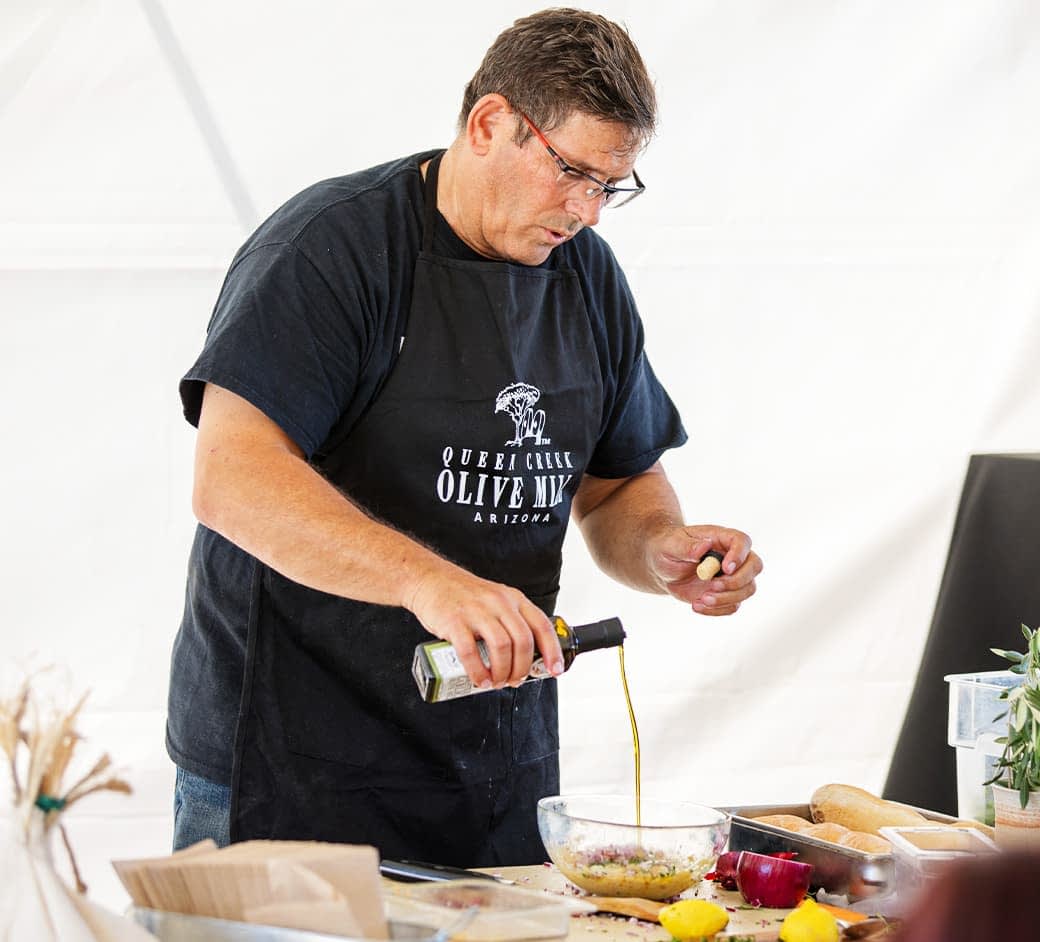Agritourism Takes Off at Arizona’s Queen Creek Olive Mill
Tourism is key to the success of Queen Creek Olive Mill’s business and the promotion of extra virgin olive oil in Arizona.
 The Rea family
The Rea family Fifty kilometers southeast of Phoenix, Arizona’s only active olive mill is working to promote extra virgin olive oil consumption through agritainment.
Perry and Brenda Rea founded Queen Creek Olive Mill with their five children in 2005. Since then, it has flourished into a multifaceted farming, milling and tourism operation, attracting more than 650,000 people annually.
We would not have succeeded if we hadn’t created an agritourism business with our olive oil production. It’s not enough to make high-quality extra virgin olive oil.
“Agritourism was new to Arizona when we began our business,” Perry Rea told Olive Oil Times. “We wanted to create a destination like one you could find in Italy, where you can see the farm, take a tour of the facility, eat the locally grown food and spend a whole day enjoying yourself.”
The Rea (pronounced Ray-uh) family started by planting different olive tree varieties to see what could work in Arizona’s desert climate, typified by extremely hot summers and short, mild winters. The operation grew organically from there, Rea said.
See Also:Istrian Officials Share Oleotourism Insights at Events in Spain and ItalyThe 22-hectare property has eight hectares of olive trees planted in medium density, with nearly 10,000 Arbosana and Koroneiki trees and various others planted around the property.
“Knowing people would have to travel about an hour outside of any Phoenix to get here, we added a restaurant to our small olive oil shop filled with locally curated products, vinegar, stuffed olives, tapenades, and, of course, our extra virgin olive oil,” Rea said.
Agritourism aims to provide visitors with an educational and recreational experience related to agriculture and rural life. It can also be a way for farmers to diversify their income and promote sustainable agriculture.
“Having our 56-acre (22-hectare) farm out in the middle of nowhere as Queen Creek was back in the early 2000s allowed us to be a destination that people from Phoenix and tourists from out-of-state would want to travel to,” Rea said. “Many of our customers were interested in what made good, high-quality extra virgin olive oil and the practices we used to make it.”

Southeast of Phoenix, Queen Creek Olive Mill boasts eight hectares of medium-density olive groves.
John Rea, Queen Creek Olive Mill’s president, said agritourism creates an environment for potential extra virgin olive oil consumers to learn what sets the product apart from other edible oils regarding its health benefits and organoleptic qualities.
“We wanted to create a space for our guests to explore the world of extra virgin olive oil, enjoy healthy and local foods, and, of course, share a bottle of wine under the shade of an olive tree,” he told Olive Oil Times.
“We think it is vital for everyone to understand and appreciate the importance of a high-quality extra virgin olive oil,” Rea added. “We want every person who leaves our farm to think twice the next time they purchase olive oil at their local grocery store.”
Two-thirds of olive oil producers said they welcomed tourists to their farm, mill and facilities, according to a recent Olive Oil Times survey. Forty-five percent of respondents said tourism was important to their businesses.
Tastings were the most common activity, with 87 percent of respondents offering the experience. Sixty-one percent organized estate or harvest tours and nearly 39 percent said they ran courses or workshops.

Perry Rea hosts a cooking demonstration, one way in which the company educates and entertains consumers with extra virgin olive oil.
As Queen Creek grows, the plan is to keep up with interest by adding new offerings and opportunities through expansion.
“We constantly attract people to our farm through dining, festivals, events, new products and educational opportunities,” Rea said. “People are hungry for knowledge, and that’s what we offer. Whether through our Olive Oil 101 class, tractor farm tours or pizza-making classes, we are constantly teaching.”
According to Perry Rea, who recently completed the Olive Oil Times Education Lab Sommelier Certificate Program in New York, adopting agritourism is a necessary synergy for olive oil producers to succeed in a highly competitive business.
“We would not have succeeded if we hadn’t created an agritourism business with our olive oil production,” he said. “It’s not enough to make high-quality extra virgin olive oil; you also have to evolve into something that will make people want to come to the farm and bring their friends and relatives from out of town. Create something unique that is hard to find outside of Europe.”
According to the local news outlet, Queen Creek Tribune, the Queen Creek Olive Mill recently received new zoning certification that cleared the way for a 13-hectare expansion. The Queen Creek Planning and Zoning Commission noted that the expansion would help promote the area’s agricultural heritage.
The agritainment zoning category was non-existent when Queen Creek opened to the public. Seeking approval for plans became problematic as the town’s existing zoning categories did not cover the types of expansion sought.
John Rea said Queen Creek is proud of its rich farming history and is going through dramatic growth like many towns in the greater Phoenix area. “There just needed to be a zoning category that would accommodate the type of business we had created,” he said.
The solution adopted by the zoning committee was to allow the owners of businesses in Queen Creek to help write a new zoning category called agritainment, allowing for various uses, including retail, restaurants, hotels, residential and venue spaces.

Tractor tours of the groves and the rest of the farm are among the many agritainment options offered by Queen Creek Olive Mill.
“We have a few things in mind, but the immediate future will be a building expansion, allowing us to have more warehouse space, a more extensive production facility and a bigger overall footprint,” Rea said. “We are considering adding more eateries, concepts and venue spaces in the slightly more distant future.”
“We are a very comprehensive business. Farming, harvesting, milling, bottling, and selling,” he added. “We carry it further by offering an on-premise restaurant, private venue areas, a two-acre (0.8‑hectare) picnic area under olive trees that can accommodate 600 people, coffee roasting by Infusion Coffee Labs, a selection of wines, and local craft beer.”
Along with 32 extra virgin olive oil and olive oil-based products, Queen Creek Olive Mill imports and blends its balsamic vinaigrette from Modena, Italy. Still, Perry Rea sees tourism as a demand driver for these products.
“Agriculture is fundamental in the shaping and birth of Queen Creek,” he said. “We aim to honor that through our olive farm and agritourism destination. We do this through our sustainability initiative, education, and future growth.”
John Rea added that focusing on sustainability is also essential, demonstrating to visitors that extra virgin olive oil benefits their health and the environment.
“We believe giving back to the earth is important, which is why we compost, use drip irrigation, have solar panels, and we’ve even built a 3.5 million gallon (13 million liter) irrigation pond on our farm,” he said. “As custodians of Queen Creek’s agricultural legacy, we aspire to harmonize tradition with continual strides in innovation.”








